Innocence of the Koh Tao Two
Australian solicitor Ian Yarwood who has been helping with the appeal of Wai Phyo and Zaw Lin who were convicted and sentenced to death for the murders of Hannah Witheridge and David Miller has made some important observations on the trial and the Thai justice system
.
While I have shared it on Facebook and this has also been published elswehere I am putting his views up on this site as a matter or record. I have attended enough trials in Thailand to never be surprised by a verdict and never surprised when the verdict flies in the face of what I have heard in court.
I am reserving comments however for the time being to allow this to digest. Here meanwhile is Ian’s view.
Suffice to say that whatever the criticism’s are of the conduct of the defence, all the lawyers involved in the appeal did not doubt that the two young Burmese should have been acquitted.
7 February 2016
SOME INSIGHTS INTO THE MURDERS OF TWO BRITISH BACKPACKERS ON THE THAI ISLAND OF KOH TAO
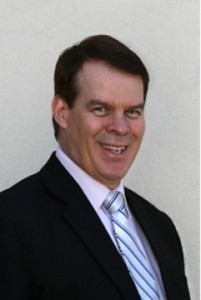 Many Western tourists are drawn to Thailand by glossy brochures and travel documentaries featuring pristine beaches, sensational diving and the friendliness of the locals. Indeed, Thailand is often described as the “Land of Smiles”.
Many Western tourists are drawn to Thailand by glossy brochures and travel documentaries featuring pristine beaches, sensational diving and the friendliness of the locals. Indeed, Thailand is often described as the “Land of Smiles”.
Everything is so cheap in the Land of Smiles. Food is cheap. Alcohol is cheap. Accommodation is cheap. Travel is cheap. Unfortunately, life is cheap too. Truth is so terribly cheap that it often appears to have no value whatsoever.
One thing that does have value is “face” and “saving face” of a powerful Thai person can come at a very high price for people on the lower rungs of an extremely class conscious society. The Burmese are even more vulnerable as the Thais look down on them as the old invaders who sacked Thai cities and dragged off the surviving inhabitants as slaves.
It was into this Land of Smiles – into this Land of Illusions – that two young British backpackers ventured. Their names were David Miller and Hannah Witheridge. Subsequently, on the morning of 15 September 2014 their battered bodies were found by a beach cleaner.
Fast forward to Christmas Eve 2015 and in the Samui Provincial Court two young Burmese workers, Zaw Lin and Wai Phyo were duly convicted of the murders of both Britons and the rape of Hannah. Wai Phyo was also convicted of stealing David’s mobile phone. Both defendants were sentenced to death.
Michael Miller’s address to the press
Shortly afterwards at the court entrance and flanked by his parents Ian and Sue Miller, David’s brother, Michael Miller read a prepared statement to members of the press. The Miller family clearly approved of the guilty verdicts. Michael Miller’s short address was punctuated by the howls of the condemned men’s mothers coming from inside the building. In a very uncomfortable scene the distraught Burmese mothers exited the court building just as Michael was winding up his address.
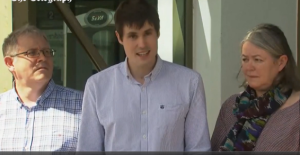
Michael Miller has since been on the receiving end of some harsh and frankly unjustified criticism for that address. The opinions that Michael expressed were, in fact, perfectly reasonable and logical in the context of the evidence the Miller family heard in court and in the context of the evidence they did not hear. The opinions were also reasonable in the context of assumptions that the Miller family might have and on inferences they might have drawn.
Very few people will know who killed David and Hannah. I was not there so I do not know who the true killers are. I cannot be 100% sure that Zaw Lin and Wai Phyo were not responsible but I respectfully disagree with the opinions expressed by Michael Miller.
To understand the fiasco it helps to know a little about Thailand and its police force. The police are allegedly notoriously corrupt and they are also not particularly bright. Just a few short days ago the Royal Thai Police raided an innocent gathering of 30 elderly bridge players in the sin city of Pattaya on suspicions of gambling. Ironically vice and crime are everywhere in Pattaya. Only a few hundred metres away the local jet ski scammers were hard at work fleecing tourists under the protection of the local police.
See for example:http://www.andrew-drummond.com/2011/03/internet-angry-takes-on-thailand-jet.html
https://www.youtube.com/watch?v=Mqi07Dc68Lk
https://www.youtube.com/watch?v=zsPuoaktoAw
In recent years there have been major revelations of the extent of slavery and human trafficking allegedly involving the Royal Thai Police and senior Thai military officers including an Army Lieutenant General. According to the helpful if imperfect Global Slavery Index there were an estimated 475,300 slaves in Thailand in 2014.
In the late 1970’s there were regular credible reports of Thai pirates attacking Vietnamese refugees who were fleeing their homeland at the end of the Vietnam War. Many of these pirates were fishermen who took advantage of some great opportunities.
The reality is that there are a lot of very dangerous people in Thailand who do not feature in the glossy tourist brochures.
On Koh Tao the police decided to charge two small Burmese men (relative puppy dogs) who were in the general vicinity of the crime scene at about the time the murders were committed. However, there were hundreds of people on Koh Tao who could have been at the crime scene at that time and some of them were wolves in comparison to Zaw Lin and Wai Phyo.
Psychologists say that ordinary law-abiding people do not suddenly commit the type of crimes for which the defendants were convicted. Psychologists explain that there is a progression from other violent crimes and/or crimes of a sexual nature. I do not know the defendants but I understand that there is no known history of them committing any violent crimes or sex crimes. They were simply focused on working and sending money home to their parents.
There has been extensive discussion elsewhere on the bungled police investigation which won’t be repeated here except to say that one should be extremely skeptical about anything a Thai police officer might say about the case.
Michael Miller did refer to the Thai lawyers who defended Zaw Lin and Wai Phyo. It would be a little naive to assume that these volunteer lawyers were properly prepared for the trial. One should also not assume that the unofficial spokesperson for the nebulous “defence team”, Mr Andy Hall has any special skills that could assist other than being fluent in spoken Thai and Burmese.
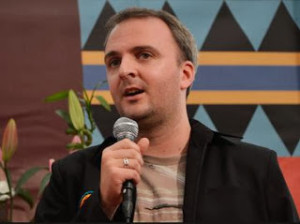 I have known Andy Hall since September 2014 and have attended three Thai courts with him in Prakanong, Nakhon Pathom and Phuket. He says that he is not a lawyer but according to his website he has a law degree with first class honours from University College London. My own observations are that he has little knowledge of the law of evidence and defamation, a poor memory, neglects to communicate properly and lacks attention to detail – although he is ridiculously brave in risking jail over his defence of some vexatious criminal defamation and Computer Crimes Act charges.
I have known Andy Hall since September 2014 and have attended three Thai courts with him in Prakanong, Nakhon Pathom and Phuket. He says that he is not a lawyer but according to his website he has a law degree with first class honours from University College London. My own observations are that he has little knowledge of the law of evidence and defamation, a poor memory, neglects to communicate properly and lacks attention to detail – although he is ridiculously brave in risking jail over his defence of some vexatious criminal defamation and Computer Crimes Act charges.
Based on my discussions with people including Jane Taupin and a retired Australian barrister who were attempting to advise the defence team, the defence lawyers appeared unprepared and appeared to have a poor knowledge of DNA evidence. Unfortunately, they also decided to ignore much of the advice given to them by the retired Australian barrister who was familiar with DNA and who was experienced in running criminal trials. The defence lawyers also squandered resources in the form of the international DNA expert, Jane Taupin who had flown from Melbourne to Koh Samui for the trial. Jane had made requests to Andy Hall for various documents explaining that she needed to examine and consider these before leaving Australia. She received nothing.
In late July 2015 Andy contacted me asking me to put him in touch with Australian experts who would know about DNA and one of the machines that the Thai police had said they used to analyse samples. I put him in touch with an Acting Inspector of the Western Australian Police. Subsequently, on 28 July 2015 Andy was also informed by the Melbourne Human Rights lawyer, Julian Burnside AO QC that Jane Taupin would be a good person to contact. Upon Andy’s request I contacted Jane’s agency “Experts Direct” the same day in order to create a contact between Jane Taupin and the defence team.
At this late stage the prosecution had already presented a great deal of its evidence. Andy has told me that he had previously been in contact with a British DNA expert. As it transpired though the defence team did not use the services of the British DNA expert. I do not know the reason(s).
The defence team was always facing an alleged problem of limited disclosure by the prosecution but the defence team really needed to be better prepared on the science of DNA many months prior July 2015.
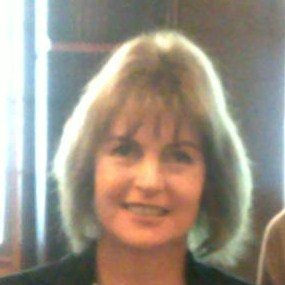 In September 2015 Jane Taupin flew into Koh Samui without the benefit of receiving any documents and met with the Thai defence team. She expressed differences of opinion to those of the prosecution experts but she also expressed doubts upon some of the opinions expressed by the Thai expert Pornthip.
In September 2015 Jane Taupin flew into Koh Samui without the benefit of receiving any documents and met with the Thai defence team. She expressed differences of opinion to those of the prosecution experts but she also expressed doubts upon some of the opinions expressed by the Thai expert Pornthip.
Ultimately, the defence team made a big mistake in deciding not to call Jane to give evidence. It is true that Jane had very few documents to analyse but she could certainly have given evidence in the witness box to the effect that the Thai police laboratories did not comply with international standards in this case and that no reasonable conclusions could be drawn from the scant documents presented by the prosecutor.
Jane could have given evidence that generally only 5 microlitres of mixed DNA would be required for the relevant test. One teaspoon of original mixed DNA sample would be enough for one thousand tests. Jane could have given evidence that pursuant to international standards, laboratories retain original mixed samples in order that they may retest the sample themselves and in order that any future defence team has an opportunity to retest an original mixed sample. The prosecution and police merely had “amplified” DNA evidence available but without the original samples one could never be sure of the source.
However, given that the defence team did not call Jane Taupin it is open to draw the inference that her evidence would not have helped the two defendants. That inference is reasonable for an outside observer but the reality is that the defence team made a mistake and that Jane’s evidence might have been enough to secure an acquittal. It certainly would have made an appeal much easier as there would be more material for defence lawyers to work with.
As it transpired, the defence team wasted Jane’s time and wasted an opportunity to present some compelling evidence before the Court. Jane had been flown to Samui with funds from generous donors across the world that had been raised for the defendants’ defence. Jane told me afterwards that she felt drained for a month after returning from Koh Samui.
Andy Hall requested an expert on the Rohingya to travel to Koh Samui for the trial. The idea was that this witness was to give evidence on the ethnic conflicts between the Rohingya (such as the pancake/roti seller who acted as police interpreter) and the ethnic Burmans such as the defendants. When the Rohingya expert met with the defence team she was told that the representative from the Burmese Government vetoed the idea of her giving evidence as the Burmese Government did not recognise the existence of Rohingya. In the circumstances, her time and effort was also wasted.
There are several examples of a lack of communication & coordination that plagued the defence team and wasted resources of volunteers and donors. In fact, after the verdict Andy Hall obtained the assistance of the Perth barrister Mark Trowell QC but neglected to inform him that the defence team had already been in contact with Jane Taupin. As a result Mark Trowell commenced obtaining opinions from a second Australian DNA expert and learned later from the retired Australian barrister of Jane’s involvement.
I submit that Michael Miller’s statement is logical and reasonable but only if based in part on: assumptions that the Thai police are honest and competent and the Thai defence lawyers were prepared; and upon the inference that Jane Taupin could not help the defendants. Once those assumptions and that inference are removed the statement ceases to appear so logical and reasonable.
The Decision of the Samui Provincial Court
I respect the decision of the Court but, with the greatest respect, I disagree with some of the important findings.
Having said that I also wish to point out that many Western Courts make mistakes with forensic evidence. No one should be under any illusion that judges in the UK, the USA or Australia are immune from being blinded by science. Indeed, Mark Trowel QC refers on his Facebook page to an article “FBI admits flaws in hair analysis over decades” by Spencer S Hsu in the Washington Post on 18 April 2015: https://www.washingtonpost.com/local/crime/fbi-overstated-forensic-hair-matches-in-nearly-all-criminal-trials-for-decades/2015/04/18/39c8d8c6-e515-11e4-b510-962fcfabc310_story.html ; www.facebook.com/MarkTrowellQC
In Australia there is the infamous case of Lindy Chamberlain (dingo at Ayers Rock case) who had been convicted on the strength of dubious forensic evidence that was later discredited but only after she had spent considerable time in jail.
In my opinion, the defence team did enough to win but it should not be at all surprised that they lost. Going to court is like going to the casino. Many things are unpredictable. Luck and chance play a huge role. It was vital that the defence team increased its odds and put forward its strongest possible defence which involved calling Jane Taupin.
According to the Great Yarmouth Mercury, Andy Hall said that the defence team was totally taken by surprise by the verdicts.
http://www.greatyarmouthmercury.co.uk/news/in_quotes_reaction_to_guilty_verdict_in_hannah_witheridge_murder_trial_1_4358751?utm_medium=twitter&utm_source=dlvr.it The retired Australian barrister who had been trying to advise the defence team was not at all surprised even though he too disagreed with the verdicts.
In my opinion, and with the greatest of respect to the Court, the so-called “DNA evidence” should have been ruled as inadmissible. The police and prosecutor had none of the alleged original mixed DNA samples that they said were recovered from Hannah’s body. In the circumstances, all the “results” flowing from such samples could not be verified or tested by the defence team. It matters not that the prosecutor says that he had “amplified” DNA as one cannot be sure of the original source. It would be easy for the police to simply compare the DNA taken from cheek swabs of the defendants then compare it with other amplified DNA that was sourced from cheek swabs taken from the defendants. That will ensure a “match” but it won’t be a match of the defendants to any original mixed semen samples.
If similar “DNA evidence” has been presented in the UK, Canada, the USA or Australia it would have been promptly ruled as inadmissible – and for very good reason.
Without the so-called “DNA evidence” the prosecution case collapses. Yes, there is circumstantial evidence that the defendants were in the vicinity of the crime scene but so were hundreds of other people. The only thing that is suspicious is that Wai Phyo agrees that he picked up A mobile phone, although there is a plausible explanation. Hearsay evidence was presented suggesting that police had A phone that was David’s but I am not even sure that the phone the police referred to was the same phone that Wai Phyo said he recovered from the beach.
The appeal papers will scrutinise the decision in great detail but one other important observation is that the evidence of defence witness Worawee Wiyawuth MD might have been misconstrued at page 38 of the judgment. It is said that Worawee testified that the police laboratory operated in keeping with international standards. In fact, he was silent on the question of whether the police laboratory operated in keeping with international standards in this case. With respect, the court’s conclusion was not supported by Worawee’s evidence.
The Appeal
On Friday, 5 February 2016 the retired Australian barrister met with the defence team and Andy Hall who acted as interpreter.
As a result of that meeting the defence team now has a reasonable understanding of the DNA evidence and all the defects in the prosecution case that have been identified by the two Australian barristers and two Australian DNA experts including Jane Taupin.
Fortunately, everyone now seems to be in agreement on how to proceed and communication has improved. The English language documents that have been drafted need to be carefully and accurately translated into Thai. It is not even necessary for the Thai defence team to have a 100% understanding of their contents. The appeal is be decided “on the papers”.
If the appeal is successful it will be as the result of some tireless pro bono work performed by four Australian experts in law and DNA. They might just save the defendants and thereby also salvage the reputations of the Thai defense team.
Ian Yarwood – Solicitor
AUSTRALIA
@IanYarwood_Law (Twitter)

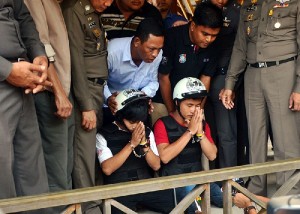
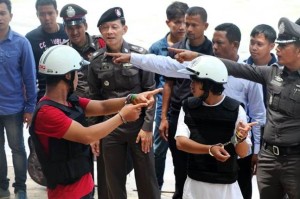



Mr Yarwood makes a basic assumption: that the Thai appeals court will rule objectively. That’s not ‘a given.’ Thai justice is not objective nor blind. The powers-that-be in Thailand want the scapegoats to remain guilty. Primary reason: to continue to shield the real perps who are related to the multi-millionaire Headman; either his family members or their pals. There is more than face involved. There are heaps of under-the-table money, and there is the importance of maintaining freedom of the Headman’s son and brother.
The odds are stacked against any accused in Thailand right from the get go. An accused is afforded little if any rights in defence of their cases. The old adage “innocent until proven guilty”, “beyond a preponderance of doubt”, etc, just do not apply in Thailand. It makes it near impossible to defend oneself. A foreign managed law firm in Pattaya cited the above reasons when I asked him why his firm stopped representing Clients facing criminal charges in Thailand.
The ambivalence of those administering the Thai justice system also has an impact, with reference to the judges and entire prosecutor and police involved in this particular case who seem to simply ignore substance and make their own rulings based on their outward bias and pressure from the local “establishment”.
To think the Thai establishment will let foreign law experts influence the outcome of this debacle is doubtful but perhaps it will put the facts on the table and again enlighten the community of the gross mismanagement of the “injustice” system in Thailand…not that the establishment cares.
Can I suggest that the criticisms of the DNA evidence are published in journals, ones of either trial attorneys/barristers or forensic experts. You may find that others will have interesting observations which are of use to the Defence.
One question – is there not a Ladd v Marshall problem for the defence here? From what you have written, the fresh observations on the DNA evidence could have been obtained and used in the trial. I don’t know what the rule is in the Thai system, but as one which was (at least partially) based on the common law it is likely to be similar.